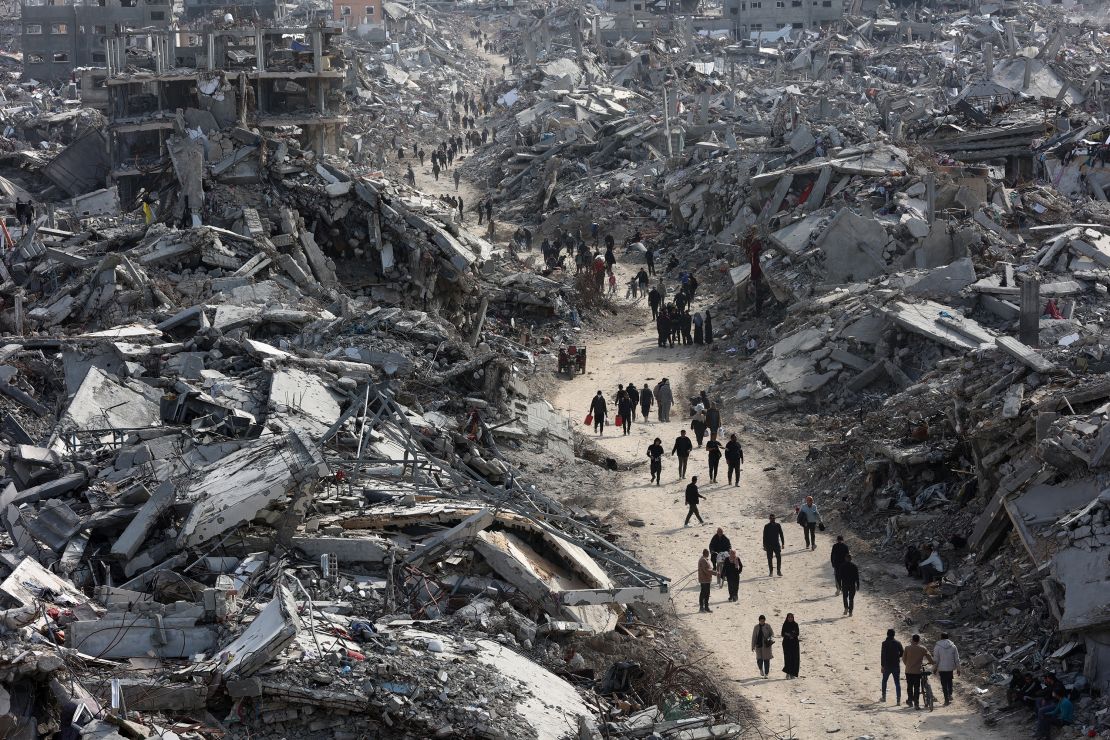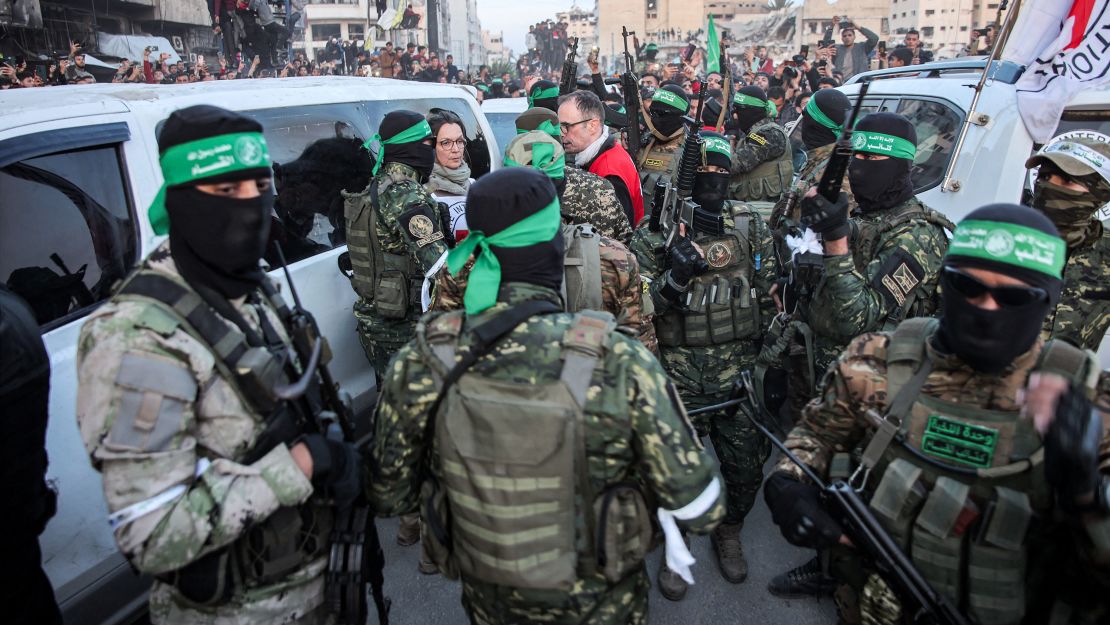CNN
—
Israel’s longest war has so far failed to destroy its main enemy, Hamas, which, despite suffering devastating losses, is framing the Gaza ceasefire agreement as a victory for itself – and a failure for Israel.
Soon after a ceasefire came into effect on Sunday, masked gunmen emerged in vehicles roaming the devastated streets of Gaza in celebration. Members of an elite unit wore their full uniform at Al Saraya Square in Gaza City during the hostage transfer. It was Hamas’ reminder that its armed wing was still here 15 months after Israel set out to destroy them.
One of Hamas’ main goals for taking 250 hostages during its brazen October 7, 2023, attack on Israel was to secure the release of Palestinian prisoners held in Israeli jails. As Israel pounded Gaza in response Hamas vowed not to return the hostages until Israel withdrew its forces from the enclave, permanently ended the war, and allowed for rebuilding.
After more than a year of fighting, Hamas and Israel in recent days reached a phased agreement that will see the release of hostages in exchange for Palestinian prisoners, in addition to a 42-day ceasefire and the entry of aid. The deal also opens the door for further negotiations that could lead to a full Israeli withdrawal from Gaza and a permanent ceasefire.
“(The agreement) achieves all these conditions… the resistance has achieved what the Palestinian people want,” Hamas senior political member Osama Hamdan told Al Jazeera after a deal was reached.
Khalil Al Hayya, Hamas’ main negotiator, said in a speech on Wednesday that Israel had failed to achieve its war goals and praised Hamas’ armed wing, Al Qassam Brigades, whose spokesman Abu Obaida commended the war in Gaza as an “inspiration” for generations to come. Israel’s main goal of the conflict was to eliminate Hamas.
Some Israeli ministers, lawmakers and even a small minority of hostage families view the acceptance of a deal as an Israeli defeat. Far-right minister Itamar Ben Gvir and his party resigned from the government and Knesset (parliament), calling the truce a “surrender.” Fellow right-winger, Finance Minister Bezalel Smotrich called it “catastrophic” and a group of army reservists labeled it “The Surrender Deal.”
“When you see … the dancing in Gaza, the celebrations in villages in Judea and Samaria – you understand which side surrendered in this deal,” Ben Gvir said in a statement on Thursday. Judea and Samaria is what Israel calls the West Bank.
But most in Israel are welcoming the agreement, including the majority of the hostage families, Israel’s President Isaac Herzog and the political opposition. Netanyahu’s office said after the security cabinet approved the deal that the prime minister still “supports the achievement of the objectives of the war.”

A source familiar with the matter told CNN that Netanyahu told ministers that the US has provided guarantees “that if Hamas sabotages a certain stage of the deal, Israel can resume fighting.”
Israel’s response to Hamas for the October 7 attack was intense. It flattened Gaza under the most severe bombardment campaign in the enclave’s history, killing tens of thousands of Palestinians and displacing hundreds of thousands more, many of whom were forced to live in tents with little food and inadequate medical care.
Israel also inflicted heavy losses on Hamas, killing its top leadership, including the mastermind of the October 7 attack Yahya Sinwar, and claimed to have killed thousands of the group’s fighters. It was relentless in rooting out reemerging militants in previously cleared neighborhoods, all while fighting, and eventually defeating, Lebanon’s Hezbollah in the north, which had opened a new front against Israel in support of Gaza.
The Hamas that was once in military and political control of Gaza has been reduced to a fraction of its old self after Israel’s 15-month campaign, and with the significant weakening of its regional allies Hezbollah and Iran, the group has become regionally isolated.

Yet the movement has continued to present itself to Palestinians as the most formidable armed resistance group against Israel, replenishing its ranks by recruiting almost as many new militants as it has lost.
“Each time Israel completes its military operations and pulls back, Hamas militants regroup and re-emerge because there’s nothing else to fill the void,” United States Secretary of State Antony Blinken said in remarks at the Atlantic Council recently.
“Indeed, we assess that Hamas has recruited almost as many new militants as it has lost. That is a recipe for an enduring insurgency and perpetual war.”
Tahani Mustafa, a senior analyst with the International Crisis Group (ICG), argues that the suffering inflicted on Gaza’s Palestinians by Israel’s war creates fertile ground for recruitment.
“You can see a recruitment surge precisely because when there’s occupation and violence you can find relevance there,” she told CNN. “How can you expect whole hosts of segments of Gaza’s population who have lost everything to simply take it lying down? It’s a war for survival. Groups like Hamas provide (the Palestinians) with the means of doing that.”
In his comments to the Atlantic Council, Blinken said the US has stressed to the Israeli government “that Hamas cannot be defeated by a military campaign alone, that without a clear alternative, a post-conflict plan and a credible political rise to the Palestinians, Hamas or something just as abhorrent and dangerous will grow back.”
The governance of post-war Gaza remains unaddressed, possibly due to skepticism over whether the ceasefire agreement will progress beyond the initial phase. Israel’s ultimate war goal is the complete destruction of Hamas. But Hamas appears unconcerned, suggesting that its cadres will play a role in rebuilding the devastated enclave. “The whole population, and the resistance as part of it, will begin rebuilding what the occupation has destroyed,” Hamas’ Hamdan told Al Jazeera.
Hamdan maintained that regardless of the outcome, the day after for Gaza will remain similar to the day before.
“The day after, is like today, is like the day before…it will be a Palestinian day,” Hamdan said.

While Hamas may be claiming victory, it has failed to force Israel to lift the crippling siege on Gaza and has presided over Israeli strikes that killed tens of thousands of Palestinian civilians and made Gaza unlivable. The October 7 attack, and the war it triggered, have had a ripple effect, significantly altering the regional balance of power and fundamentally reshaping the region.
Hamas doesn’t see its survival as a goal in this war, but for Israel, the group’s very survival can be considered a “defeat,” the ICG’s Mustafa said.













